The Chicago Bears are a professional American football team based in Chicago. The Bears compete in the National Football League as a member club of the league's National Football Conference North division. The Bears have won nine NFL Championships, including one Super Bowl, and hold the NFL record for the most enshrinees in the Pro Football Hall of Fame and the most retired jersey numbers. The Bears have also recorded the second-most victories of any NFL franchise, only behind the Green Bay Packers.
The franchise was founded in Decatur, Illinois, on September 20, 1919 and moved to Chicago in 1921. It is one of only two remaining franchises from the NFL's founding in 1920, along with the Arizona Cardinals, which was originally also in Chicago. The team played home games at Wrigley Field on Chicago's North Side through the 1970 season; they now play at Soldier Field on the Near South Side, adjacent to Lake Michigan. The Bears have a long-standing rivalry with the Green Bay Packers.
The team headquarters, Halas Hall, is in the Chicago suburb of Lake Forest, Illinois. The Bears practice at adjoining facilities there during the season, and began hosting Training Camp at Halas Hall in 2020 after major renovations.
Franchise history
1919–1939: Early Bears
Originally named the Decatur Staleys, the club was established by the A. E. Staley food starch company of Decatur, Illinois as a company team. This was the typical start for several early professional football franchises. The team played independently in 1919, winning the Central Illinois Championship. was their inaugural regular season completed in the newly formed American Professional Football Association in 1922).
Full control of the team was turned over to Halas and Sternaman in 1921. Official team and league records cite Halas as the founder as he took over the team in 1920 when it became a charter member of the NFL.
The team relocated to Chicago in 1921, where the club was renamed the Chicago Staleys. Under an agreement reached by Halas and Sternaman with Staley, Halas purchased the rights to the club from Staley for US$100.
In 1922, Halas changed the team name from the Staleys to the Bears. The team moved into Wrigley Field, which was home to the Chicago Cubs baseball franchise. As with several early NFL franchises, the Bears derived their nickname from their city's baseball team. Halas liked the bright orange-and-blue colors of his alma mater, the University of Illinois, and the Bears adopted those colors as their own, albeit in a darker shade of each.
The Staleys/Bears dominated the league in the early years. Their rivalry with the Chicago Cardinals, the oldest in the NFL, was key in four out of the first six league titles. During the league's first six years, the Bears lost twice to the Canton Bulldogs, and split with their crosstown rival Cardinals, but no other team in the league defeated the Bears more than a single time. During that span, the Bears posted 34 shutouts.
The Bears' rivalry with the Green Bay Packers is one of the oldest and most storied in American professional sports, dating back to 1921. In one infamous incident that year, Halas got the Packers expelled from the league in order to prevent their signing a particular player, and then graciously got them re-admitted after the Bears had closed the deal with that player.
The franchise was an early success under Halas, capturing the NFL Championship in and remaining competitive throughout the decade. In 1924 the Bears claimed the Championship after defeating the Cleveland Bulldogs on December 7, even putting the title "World's Champions" on their 1924 team photo. But the NFL had ruled that games after November 30 did not count towards league standings, and the Bears had to settle for second place behind Cleveland. Their only losing season came in.
During the 1920s the club was responsible for triggering the NFL's long-standing rule that a player could not be signed until his college's senior class had graduated. The NFL took that action as a consequence of the Bears' aggressive signing of famous University of Illinois player Red Grange within a day of his final game as a collegian.
Despite much of the on-field success, the Bears were a team in trouble. They faced the problem of increased operating costs and flatlined attendance. The Bears would only draw roughly 5,000–6,000 fans a game, while a University of Chicago game would draw 40,000–50,000 fans a game. By adding top college football draw Red Grange to the roster, the Bears knew that they found something to draw more fans to their games. C.C. Pyle was able to secure a $2,000 per game contract for Grange, and in one of the first games, the Bears defeated the Green Bay Packers, 21–0. However, Grange remained on the sidelines while learning the team's plays from Bears quarterback Joey Sternaman. Later in 1925, The Bears would go on a barnstorming tour, showing off the best football player of the day. 75,000 people paid to see Grange lead the Bears to a 17–7 victory over the Los Angeles Tigers, who were a quickly put together team of West Coast college all-stars. After a loss to San Francisco, the Bears cruised to a 60–3 over a semi-pro team called the Portland All Stars.
Any hopes that Grange would lead the Bears to glory in 1926 were quickly dashed. A failed contract talk led to Grange bolting to the AFL's New York Yankees, owned by Pyle. The Bears also lost star quarterback Joey Sternaman, who joined the Chicago Bulls of the AFL. The Bears replaced Grange with Paddy Driscoll, a star football player in his own right. The Bears used the money made from the Grange barn-storming tour to sign the man that replaced him. Grange split his time between making movies and playing football. However, the time was not right to have two competing pro football leagues, and the AFL folded after only one season. Grange would return to the Bears. defeated the Bears 30–13 on a cold, icy day at the Polo Grounds.
1940s: The Monsters of the Midway
From 1940 to 1947, quarterback Sid Luckman led the Bears to victories in four out of the five NFL Championship Games in which they appeared. The team acquired the University of Chicago's discarded nickname "Monsters of the Midway" and their now-famous helmet wishbone "C", as well as a newly penned theme song that declared them "The Pride and Joy of Illinois". One famous victory during that period was their 73–0 victory over the favored Washington Redskins at Griffith Stadium in the 1940 NFL Championship Game; the score is still an NFL record for lopsided results. The secret behind the one-sided outcome was the introduction of a new offensive formation by Halas. The T-formation, as Halas named it, involved two running backs instead of the traditional one in the backfield. Luckman established himself as one of the franchise's most elite quarterbacks. Between 1939 and 1950, he set the Bears' passing records for most career touchdowns, yards, and completions. Many of Luckman's records stood for decades before they were eclipsed by Jay Cutler in.
Cutler then went on to break Luckman's franchise record for most career passing touchdowns a year later in.
1950s–1968: Late-Halas era
After declining throughout the 1950s, the team rebounded in to capture its eighth NFL Championship, which would be its last until 1985. The late 1960s and early-1970s produced notable players like Dick Butkus, Gale Sayers, and Brian Piccolo, who died of embryonal carcinoma in 1970. The American television network ABC aired a movie about Piccolo in 1971 entitled Brian's Song, starring James Caan and Billy Dee Williams in the roles of Piccolo and Sayers respectively; Jack Warden won an Emmy Award for his performance as Halas. The movie was later released for theater screenings after first being shown on television. Despite Hall of Fame careers, Butkus and Sayers would also have their careers cut short due to injuries, hamstringing the Bears of this era.
Halas retired as coach in 1967 and spent the rest of his days in the front office. He became the only person to be involved with the NFL throughout the first 60 years of its existence. He was also a member of the Pro Football Hall of Fame's first induction class in 1963. As the only living founder of the NFL at the February 1970 merger between the NFL and the American Football League, the owners honored Halas by electing him the first President of the National Football Conference, a position that he held until his death in 1983. In his honor, the NFL named the NFC Championship trophy as the George Halas Memorial Trophy.
1969–1982: Struggles
After the merger, the Bears finished the 1970 season last place in their division, a repeat of their placing in the 1969 season. In 1975, the Bears drafted Walter Payton from Jackson State University with their first pick. He won the NFL Most Valuable Player Award in the 1977–78 season. Payton would go on to eclipse Jim Brown's NFL career rushing record in 1984 before retiring in 1987, and would hold the mark until when Emmitt Smith of the Dallas Cowboys surpassed it. Payton's career and personality would capture the hearts of Bear fans, who called him "Sweetness". He died from a rare form of liver cancer in 1999 at the age of 45.
On November 1, 1983, a day after the death of George Halas, his oldest daughter, Virginia McCaskey, took over as the majority owner of the team. Her husband, Ed McCaskey, succeeded her father as the chairman of the board. Their son Michael became the third president in team history. Mrs. McCaskey holds the honorary title of "secretary of the board of directors", but the 90-year–old matriarch has been called the glue that holds the franchise together. Mrs. McCaskey's reign as the owner of the Bears was not planned, as her father originally earmarked her brother, George "Mugs" Halas Jr. as the heir apparent to the franchise. However, he died of a massive heart attack in 1979. Her impact on the team is well-noted as her own family ha…
Eye-catching new design Chicago Bears clothing will be the perfect gift for Chicago Bears fans. Clothing on printed with unique and fancy designs, limited number of products.
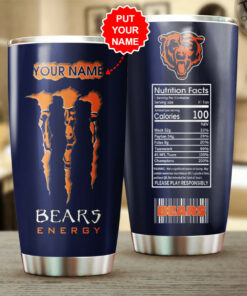
Best Sellers Chicago Bears Tumbler Cup
$29.95 – $35.95
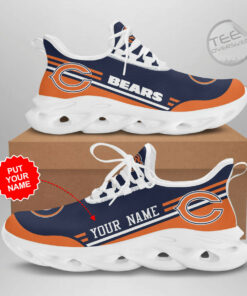
Best Sellers Chicago Bears sneaker
$85.95 – $85.98
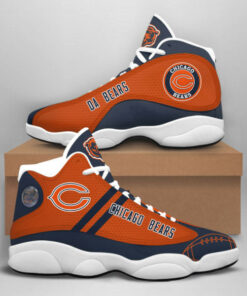
Best Sellers Chicago Bears Shoes
$89.95 – $89.98
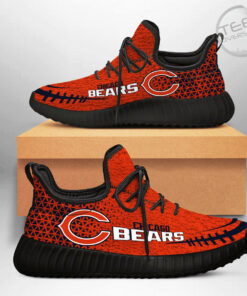
Best Sellers Chicago Bears designer shoes
$85.95 – $85.98
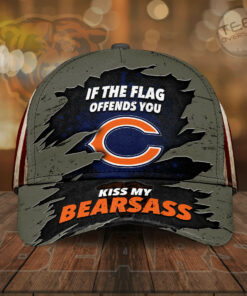
Chicago Bears Cap – NFL Hat
$29.95 – $29.98
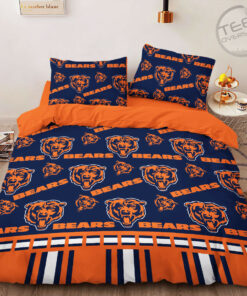
Chicago Bears bedding set
$55.95 – $77.95
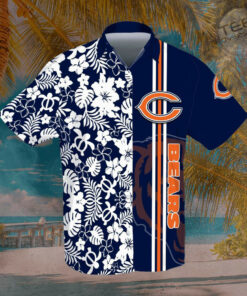
Chicago Bears Hawaiian Shirt, Hawaiian Shorts 3D – NFL Clothes
$42.95 – $43.95

Chicago Bears Hollow Tank Top, Leggings 3D – NFL Clothes
$75.95 – $75.98
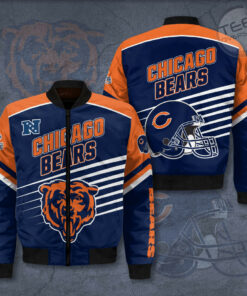
Chicago Bears Bomber Jacket 3D – NFL Clothes
$59.95 – $59.98
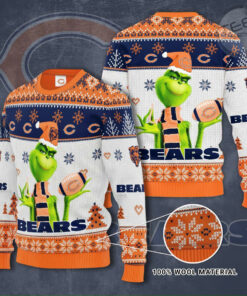
Chicago Bears sweater 3D – NFL Clothes
$45.95 – $45.98
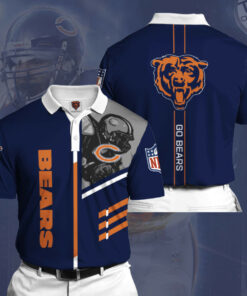
Chicago Bears Polo 3D – NFL Clothes
$41.95 – $41.98
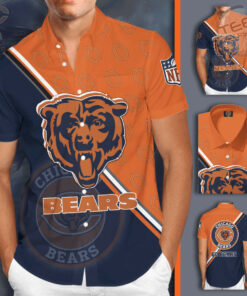
Chicago Bears Short Sleeve Dress Shirt 3D – NFL Clothes
$35.95 – $35.98
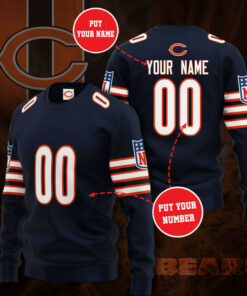
Chicago Bears Sweatshirt 3D – NFL Clothes
$41.95 – $41.98
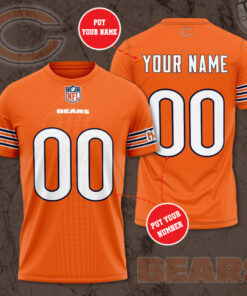
Chicago Bears T-shirt 3D – NFL Clothes
$29.95 – $29.98
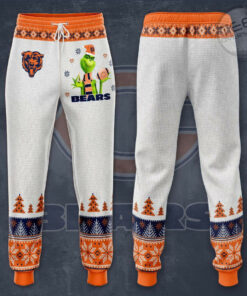
Best Sellers Chicago Bears Sweatpant 3D – NFL Clothes
$45.95 – $45.98
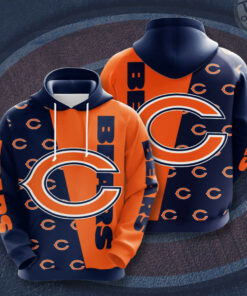
Best Sellers Chicago Bears hoodie 3D – NFL Clothes
$45.95 – $45.98
The franchise was founded in Decatur, Illinois, on September 20, 1919 and moved to Chicago in 1921. It is one of only two remaining franchises from the NFL's founding in 1920, along with the Arizona Cardinals, which was originally also in Chicago. The team played home games at Wrigley Field on Chicago's North Side through the 1970 season; they now play at Soldier Field on the Near South Side, adjacent to Lake Michigan. The Bears have a long-standing rivalry with the Green Bay Packers.
The team headquarters, Halas Hall, is in the Chicago suburb of Lake Forest, Illinois. The Bears practice at adjoining facilities there during the season, and began hosting Training Camp at Halas Hall in 2020 after major renovations.
Franchise history
1919–1939: Early Bears
Originally named the Decatur Staleys, the club was established by the A. E. Staley food starch company of Decatur, Illinois as a company team. This was the typical start for several early professional football franchises. The team played independently in 1919, winning the Central Illinois Championship. was their inaugural regular season completed in the newly formed American Professional Football Association in 1922).
Full control of the team was turned over to Halas and Sternaman in 1921. Official team and league records cite Halas as the founder as he took over the team in 1920 when it became a charter member of the NFL.
The team relocated to Chicago in 1921, where the club was renamed the Chicago Staleys. Under an agreement reached by Halas and Sternaman with Staley, Halas purchased the rights to the club from Staley for US$100.
In 1922, Halas changed the team name from the Staleys to the Bears. The team moved into Wrigley Field, which was home to the Chicago Cubs baseball franchise. As with several early NFL franchises, the Bears derived their nickname from their city's baseball team. Halas liked the bright orange-and-blue colors of his alma mater, the University of Illinois, and the Bears adopted those colors as their own, albeit in a darker shade of each.
The Staleys/Bears dominated the league in the early years. Their rivalry with the Chicago Cardinals, the oldest in the NFL, was key in four out of the first six league titles. During the league's first six years, the Bears lost twice to the Canton Bulldogs, and split with their crosstown rival Cardinals, but no other team in the league defeated the Bears more than a single time. During that span, the Bears posted 34 shutouts.
The Bears' rivalry with the Green Bay Packers is one of the oldest and most storied in American professional sports, dating back to 1921. In one infamous incident that year, Halas got the Packers expelled from the league in order to prevent their signing a particular player, and then graciously got them re-admitted after the Bears had closed the deal with that player.
The franchise was an early success under Halas, capturing the NFL Championship in and remaining competitive throughout the decade. In 1924 the Bears claimed the Championship after defeating the Cleveland Bulldogs on December 7, even putting the title "World's Champions" on their 1924 team photo. But the NFL had ruled that games after November 30 did not count towards league standings, and the Bears had to settle for second place behind Cleveland. Their only losing season came in.
During the 1920s the club was responsible for triggering the NFL's long-standing rule that a player could not be signed until his college's senior class had graduated. The NFL took that action as a consequence of the Bears' aggressive signing of famous University of Illinois player Red Grange within a day of his final game as a collegian.
Despite much of the on-field success, the Bears were a team in trouble. They faced the problem of increased operating costs and flatlined attendance. The Bears would only draw roughly 5,000–6,000 fans a game, while a University of Chicago game would draw 40,000–50,000 fans a game. By adding top college football draw Red Grange to the roster, the Bears knew that they found something to draw more fans to their games. C.C. Pyle was able to secure a $2,000 per game contract for Grange, and in one of the first games, the Bears defeated the Green Bay Packers, 21–0. However, Grange remained on the sidelines while learning the team's plays from Bears quarterback Joey Sternaman. Later in 1925, The Bears would go on a barnstorming tour, showing off the best football player of the day. 75,000 people paid to see Grange lead the Bears to a 17–7 victory over the Los Angeles Tigers, who were a quickly put together team of West Coast college all-stars. After a loss to San Francisco, the Bears cruised to a 60–3 over a semi-pro team called the Portland All Stars.
Any hopes that Grange would lead the Bears to glory in 1926 were quickly dashed. A failed contract talk led to Grange bolting to the AFL's New York Yankees, owned by Pyle. The Bears also lost star quarterback Joey Sternaman, who joined the Chicago Bulls of the AFL. The Bears replaced Grange with Paddy Driscoll, a star football player in his own right. The Bears used the money made from the Grange barn-storming tour to sign the man that replaced him. Grange split his time between making movies and playing football. However, the time was not right to have two competing pro football leagues, and the AFL folded after only one season. Grange would return to the Bears. defeated the Bears 30–13 on a cold, icy day at the Polo Grounds.
1940s: The Monsters of the Midway
From 1940 to 1947, quarterback Sid Luckman led the Bears to victories in four out of the five NFL Championship Games in which they appeared. The team acquired the University of Chicago's discarded nickname "Monsters of the Midway" and their now-famous helmet wishbone "C", as well as a newly penned theme song that declared them "The Pride and Joy of Illinois". One famous victory during that period was their 73–0 victory over the favored Washington Redskins at Griffith Stadium in the 1940 NFL Championship Game; the score is still an NFL record for lopsided results. The secret behind the one-sided outcome was the introduction of a new offensive formation by Halas. The T-formation, as Halas named it, involved two running backs instead of the traditional one in the backfield. Luckman established himself as one of the franchise's most elite quarterbacks. Between 1939 and 1950, he set the Bears' passing records for most career touchdowns, yards, and completions. Many of Luckman's records stood for decades before they were eclipsed by Jay Cutler in.
Cutler then went on to break Luckman's franchise record for most career passing touchdowns a year later in.
1950s–1968: Late-Halas era
After declining throughout the 1950s, the team rebounded in to capture its eighth NFL Championship, which would be its last until 1985. The late 1960s and early-1970s produced notable players like Dick Butkus, Gale Sayers, and Brian Piccolo, who died of embryonal carcinoma in 1970. The American television network ABC aired a movie about Piccolo in 1971 entitled Brian's Song, starring James Caan and Billy Dee Williams in the roles of Piccolo and Sayers respectively; Jack Warden won an Emmy Award for his performance as Halas. The movie was later released for theater screenings after first being shown on television. Despite Hall of Fame careers, Butkus and Sayers would also have their careers cut short due to injuries, hamstringing the Bears of this era.
Halas retired as coach in 1967 and spent the rest of his days in the front office. He became the only person to be involved with the NFL throughout the first 60 years of its existence. He was also a member of the Pro Football Hall of Fame's first induction class in 1963. As the only living founder of the NFL at the February 1970 merger between the NFL and the American Football League, the owners honored Halas by electing him the first President of the National Football Conference, a position that he held until his death in 1983. In his honor, the NFL named the NFC Championship trophy as the George Halas Memorial Trophy.
1969–1982: Struggles
After the merger, the Bears finished the 1970 season last place in their division, a repeat of their placing in the 1969 season. In 1975, the Bears drafted Walter Payton from Jackson State University with their first pick. He won the NFL Most Valuable Player Award in the 1977–78 season. Payton would go on to eclipse Jim Brown's NFL career rushing record in 1984 before retiring in 1987, and would hold the mark until when Emmitt Smith of the Dallas Cowboys surpassed it. Payton's career and personality would capture the hearts of Bear fans, who called him "Sweetness". He died from a rare form of liver cancer in 1999 at the age of 45.
On November 1, 1983, a day after the death of George Halas, his oldest daughter, Virginia McCaskey, took over as the majority owner of the team. Her husband, Ed McCaskey, succeeded her father as the chairman of the board. Their son Michael became the third president in team history. Mrs. McCaskey holds the honorary title of "secretary of the board of directors", but the 90-year–old matriarch has been called the glue that holds the franchise together. Mrs. McCaskey's reign as the owner of the Bears was not planned, as her father originally earmarked her brother, George "Mugs" Halas Jr. as the heir apparent to the franchise. However, he died of a massive heart attack in 1979. Her impact on the team is well-noted as her own family ha…
Eye-catching new design Chicago Bears clothing will be the perfect gift for Chicago Bears fans. Clothing on printed with unique and fancy designs, limited number of products.

Best Sellers Chicago Bears Tumbler Cup
$29.95 – $35.95

Best Sellers Chicago Bears sneaker
$85.95 – $85.98

Best Sellers Chicago Bears Shoes
$89.95 – $89.98

Best Sellers Chicago Bears designer shoes
$85.95 – $85.98

Chicago Bears Cap – NFL Hat
$29.95 – $29.98

Chicago Bears bedding set
$55.95 – $77.95

Chicago Bears Hawaiian Shirt, Hawaiian Shorts 3D – NFL Clothes
$42.95 – $43.95

Chicago Bears Hollow Tank Top, Leggings 3D – NFL Clothes
$75.95 – $75.98

Chicago Bears Bomber Jacket 3D – NFL Clothes
$59.95 – $59.98

Chicago Bears sweater 3D – NFL Clothes
$45.95 – $45.98

Chicago Bears Polo 3D – NFL Clothes
$41.95 – $41.98

Chicago Bears Short Sleeve Dress Shirt 3D – NFL Clothes
$35.95 – $35.98

Chicago Bears Sweatshirt 3D – NFL Clothes
$41.95 – $41.98

Chicago Bears T-shirt 3D – NFL Clothes
$29.95 – $29.98

Best Sellers Chicago Bears Sweatpant 3D – NFL Clothes
$45.95 – $45.98

Best Sellers Chicago Bears hoodie 3D – NFL Clothes
$45.95 – $45.98
Nhận xét
Đăng nhận xét